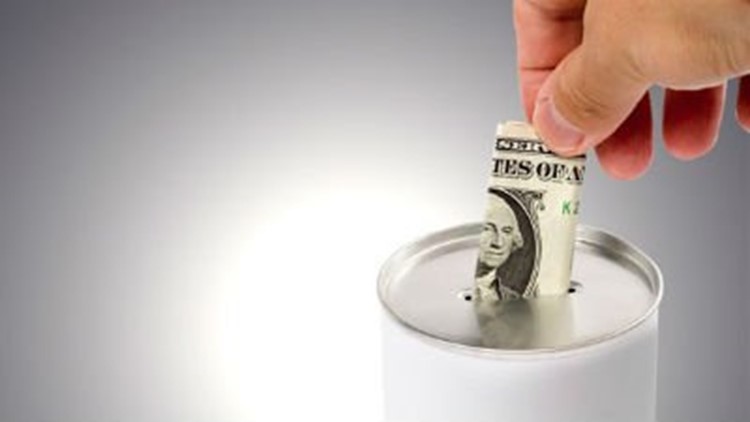By Amanda Enayati
Special to CNN
Editor’s note: Amanda Enayati ponders the theme of seeking serenity, the quest for well-being and life balance in stressful times. Follow her on Twitter or on Facebook.
(CNN) — There’s a good chance you’ve seen the 7-year-old tragicomic superstar of TLC’s Here Comes Honey Boo Boo declare in a jaw-dropping video clip: “A dollar makes me holler.”
Whether you almost fell off your chair laughing or recoiled in horror at the child’s statement, you might be one of the multitudes of parents who, consciously or not, subscribes to the broader principle that spending your dollars does, in fact, make your child holler with joy.
But a growing body of research paints a compelling picture that may help us rethink some of our over-the-top spending on children. These studies confirm some age-old wisdom about happiness: If the goal really is to make our children happy, perhaps what we ought to be doing is not over-indulging them, but giving them the opportunity to give.
According to the annual Tooth Fairy survey, the Fairy is delivering an average of $3 per tooth, up 15% from last year, with some children hitting the jackpot with as much as $20 per tooth.
Last June Bundle, a site that analyzes spending patterns, rated the American cities that spoil their children the most, as measured by household spending on purchases from children’s toy and clothing stores, and other “kids’ services” (you know, like toddler mani-pedis and 150-person catered birthday parties in hotel ballrooms).
New York City and Brooklyn (which, alas, introduced the world to “babyccinos”; maybe baby Spanx are next?) topped the list of child spoilers. Other cities at the top of the list included Miami, Minneapolis, Tulsa, Dallas, Atlanta and Los Angeles.
But are the cash, toys, clothes and foamy pretend-coffees making our children happy?
Probably not.
According to a recent study by psychologists at the University of British Columbia, young children are happier to give than to receive. In the study, toddlers who were asked to give away their own treats, as well as extra treats, showed greater happiness about sharing their own possessions, suggesting that the act of personal sacrifice was emotionally rewarding.
While the children in the study were giving away a personal belonging — their goldfish crackers — the study’s principle rests more generally on pro-social spending, says lead author Lara Aknin, assistant professor of psychology at Simon Fraser University in Vancouver, British Columbia.
“You can construe that pro-social behavior broadly to include giving time volunteering, giving money to causes or giving other resources. All of these correlate to happiness.”
The joy of helping others, says Aknin, is an inherent part of human nature.
The research was about seeing if the same joy of giving we see in adults is also present in our earliest acts of giving, notes J. Kiley Hamlin, assistant professor of developmental psychology at the University of British Columbia, who was also involved in the study. “Many people think that children are inherently selfish and we need to teach them how to be nice and feel good about giving to others.”
But maybe we don’t need to train children to feel good about giving, says Hamlin. As it turns out, children are naturally altruistic.
The benefits of giving and cooperating with others may be part of the system from the get-go, she observes.
Moreover, pro-social spending can be a virtuous cycle. When people recall a time they spent generously, it makes them happy. That sets up and triggers a positive feedback loop between generous spending and happiness, according to Aknin.
“We found that spending money on others leads to higher levels of happiness than spending money on yourself.” But the giving does not have to be extravagant, she says. In a 2008 study involving students, Aknin and her colleagues found that spending as little as $5 on others has emotional benefits.
Another fascinating nuance to our inclination to spoil children is the potential for the overindulgence to dampen their ability to savor everyday joys. In a 2010 study, titled “Money Giveth, Money Taketh Away,” Dr. Jordi Quoidbach and his colleagues found evidence that “having access to the best things in life may actually undermine one’s ability to reap enjoyment from life’s small pleasures.”
How many times have you heard parents grouse that their children are ungrateful? Is it possible that we have an unwitting hand in this perceived lack of gratitude? We may well be anesthetizing our children by constantly plying them with stuff.
That is a reasonable hypothesis, says Hamlin, adding that providing external rewards for things like jobs well done can inhibit the emotional benefits children get from them. “We should be striving for internal rewards as much as possible.”
“Research shows that underindulgence — indulging a little less than you usually do — holds one key to getting more happiness for your money,” writes Dr. Elizabeth Dunn, associate professor of psychology at the University of British Columbia researcher, who has also worked on several of the studies mentioned above, in a recent New York Times opinion piece.
In the end, the work of Aknin and her colleagues may help shift how we seek to make our children happy.
“Consider that maybe children would be happier giving things away than receiving them,” says Aknin. “Give them the opportunity to give.”
What are the best ways for children to give back to their families and communities? Share your ideas in the comments section below.



